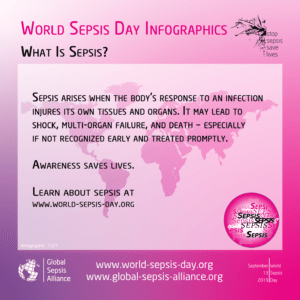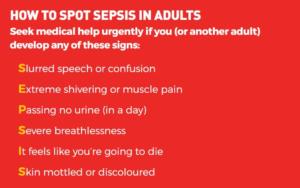What is sepsis?
The Sepsis Alliance describes sepsis as “the body’s overwhelming and life-threatening response to infection that can lead to tissue damage, organ failure, and death.”
Whereas The UK Sepsis Trust acknowledges it’s your body’s overactive and toxic response to an infection.
“Sepsis (also known as blood poisoning) is the immune system’s overreaction to an infection or injury. Normally our immune system fights infection – but sometimes, for reasons we don’t yet understand, it attacks our body’s own organs and tissues. If not treated immediately, sepsis can result in organ failure and death. Yet with early diagnosis, it can be treated with antibiotics.“
Sepsis occurs when the body’s immune system stops tackling infection as it normally would and turns on itself. You may have heard it referred to as ‘blood poisoning’.
Once more, sepsis is not a contagious disease. If you have the infection, it spreads through your blood stream but cannot then move on to someone else.
Source, Global Sepsis Alliance
Who can get sepsis?
Sadly, anybody can develop sepsis which makes it impossible to predict. However, there are some factors that indicate an increased risk of infection and thus sepsis. Those at an increased risk include:
- Babies under one (particularly if born prematurely, or their mother had an infection during pregnancy);
- Over 75’s
- People with diabetes;
- Those with a weakened immune system, such as those undergoing chemotherapy or who have recently had an organ transplant;
- People who have recently had surgery or serious illness;
- Women who have just given birth or had a miscarriage or abortion.
- Babies under the age of one are at high risk
How do I prevent sepsis?
Sepsis cannot be prevented. However, there are precautions that can be taken to mitigate the risks including:
- Keeping up to date with vaccines (especially for babies, older people and pregnant women);
- Cleaning and caring for any wounds at any time;
- Following instructions when prescribed antibiotics, including completing a course even if you feel better;
- Wash your hands regularly and teach children (and vulnerable people) to do the same.
How does sepsis develop?
Sepsis can initially appear to be a regular infection, but it develops quickly and can be fatal as toxic blood flows through the body, attacks and shuts down vital organs and in extreme cases plunges the body into septic shock.
Early detection and treatment is essential so that antibiotics can be prescribed and the progress of sepsis can be halted.
How do I spot the signs of sepsis?
Seek medical help urgently if you (or another adult) develop any of these signs:
- Slurred speech or confusion
- Extreme shivering or muscle pain
- Passing no urine (in a day)
- Severe breathlessness
- It feels like you’re going to die
- Skin mottled or discoloured
Source, The UK Sepsis Trust
Firstly, it is important to know what the signs of sepsis are so you can spot them either in yourself, or more likely for a friend, family member or vulnerable people. Vulnerable people include children, people who have difficulty communicating, people with learning difficulties, or people with dementia.
Remember, it is always better to seek help if you are at all concerned. Medical professionals would much rather you asked for help and did not have sepsis, than you waited to ask and the disease developed.
Secondly, if you are unsure, you can call 111 in the UK. If you are sure it is sepsis or the clinicians at NHS 111 suspect it might be then you must call 999, or attend your nearest Accident and Emergency department and tell them that you are concerned about sepsis.
How can you treat sepsis?
If you are suffering from sepsis you need immediate medical attention at hospital. If it is caught quickly, it may be possible to treat it with antibiotics. In some cases, treatment may include surgery to remove infection.
Recovery from sepsis
If sepsis is treated rapidly, a person can make a full recovery. However, it is not unusual to suffer physically and emotionally after the infection is tackled.
In conclusion, it is important to take recovery at your own pace, adjust where possible, build up your strength and seek help from your GP, or support groups.
Special thanks to all contributing sources, including NHS.co.uk
Sepsis is a life-threatening condition that can affect anyone and can unfortunaltly be made much worse due to medical negligence. If you have suffered from medical negligence relating to sepsis then please visit our sepsis claims page to find out more information on how we can help.




